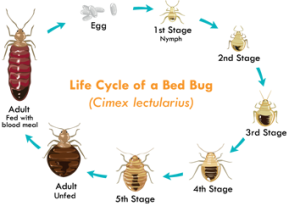Types of Insect Control: Which Approach Is Right for Your Infestation?
When faced with an insect problem, the choice of a suitable method for pest control is crucial in successfully taking care of the circumstance. From chemical treatments to organic services, there exists a variety of approaches that can be employed to attend to different sorts of bugs. Each method includes its own set of benefits and considerations, making the decision-making process a nuanced one. Understanding the subtleties of each strategy and examining their compatibility with the particular insect infestation handy is vital for attaining lasting success in pest management. By discovering the numerous types of insect control approaches readily available, people can make enlightened decisions customized to their distinct circumstances, making certain an extra sustainable and effective result in pest removal.
Chemical Pest Control
Chemical parasite control involves the usage of synthetic or normally obtained chemicals to manage and get rid of pest populaces efficiently. This approach is frequently made use of in agriculture, forestry, and household setups to deal with a large range of pests, including rodents, insects, and weeds. Making use of chemical pesticides can supply quick and targeted services to pest invasions, making it a prominent choice for numerous people and services.
Among the essential benefits of chemical insect control is its capability to quickly eliminate bugs, minimizing the threat of damages to crops, home, and human wellness. By utilizing details chemicals that target specific bugs, this technique can efficiently regulate infestations while minimizing injury to useful organisms and the setting when used appropriately.
However, the use of chemical bug control additionally increases problems concerning possible damaging results on non-target types, water resources, and human health and wellness. It is critical to adhere to security standards, use chemicals sensibly, and take into consideration alternate pest control approaches to reduce these dangers and ensure lasting parasite administration techniques.
Biological Parasite Control
Biological bug control, likewise called biocontrol, makes use of living microorganisms to reduce and manage parasite populaces normally. This method takes advantage of the power of nature to regulate bugs without the demand for synthetic chemicals. Biocontrol can include the introduction of natural opponents of the parasite species, such as killers, bloodsuckers, or microorganisms, to subdue bug populations. By utilizing the pest's all-natural killers or microorganisms, organic parasite control offers a lasting and environmentally friendly service to pest administration.

Mechanical Parasite Control
Utilizing hand-operated and physical techniques to take care of pest populaces, mechanical bug control uses an alternative approach that does not depend on making use of living microorganisms or synthetic chemicals. see this site This technique includes using barriers, catches, or various other tools to physically prevent or eliminate parasites. By obstructing parasite access factors or establishing catches to catch them, mechanical parasite control can properly lower problems without introducing chemicals right into the environment.
One usual instance of mechanical bug control is the use of mesh screens on doors and home windows to stop pests from entering buildings. This easy yet efficient approach serves as a physical barrier, keeping pests out while permitting appropriate air flow. Furthermore, devices like mousetraps, fly swatters, and ultrasonic repellents fall under the mechanical insect control classification.
While mechanical pest control methods can be labor-intensive and need normal surveillance and maintenance, they use a environmentally friendly and lasting option for taking care of insect infestations. By integrating various mechanical techniques, residential or commercial property owners can produce a comprehensive pest control method that reduces dependence on chemical pesticides.
Physical Pest Control

Some typical physical parasite control techniques include using barriers such as nets or displays to stop pest entry, traps to capture and remove insects, and hand-picking to physically get rid of pests from plants or structures. Additionally, techniques like heat therapies can be used to control parasites like bed bugs by elevating the temperature to degrees that are lethal to the insects.
Physical pest control is specifically helpful in incorporated pest administration (IPM) methods, where numerous bug control methods are incorporated for efficient insect management while lessening using chemicals. By making use of pest prevention physical parasite control methods, individuals can successfully attend to insect problems with very little ecological influence.
Integrated Insect Administration
When implementing physical insect control methods as part of bug monitoring methods, Integrated Insect Management (IPM) becomes a detailed strategy that leverages numerous strategies to properly regulate pest populations. IPM focuses on long-term avoidance of bugs via a combination of biological, social, physical, and chemical devices customized to particular pest concerns. By integrating numerous control techniques, IPM intends to reduce the dangers connected with insects while also reducing reliance on chemical services.
One key element of IPM is the emphasis on surveillance and examining pest populaces to figure out the most appropriate control techniques. This aggressive approach enables early intervention and targeted approaches, leading to a lot more reliable insect administration. Furthermore, IPM promotes environmentally friendly techniques by focusing on non-chemical control approaches and just using chemicals as a last resource.
Final Thought

By making use of the insect's natural predators or virus, biological insect control supplies a environmentally pleasant and sustainable option to pest administration. - Kings pest control Cincinnati
Utilizing physical and hand-operated methods to handle pest populaces, mechanical pest control offers an alternate strategy that does not count on the use of living microorganisms or artificial chemicals.An effective technique to managing insect populations without relying on chemical or biological approaches includes click here to find out more the usage of physical bug control methods.When carrying out physical pest control techniques as part of parasite administration techniques, Integrated Insect Administration (IPM) emerges as a detailed approach that leverages different techniques to properly control pest populaces. Chemical pest control includes the usage of chemicals, organic pest control uses all-natural predators, mechanical pest control entails physical obstacles, physical insect control includes capturing or eliminating parasites, and integrated parasite monitoring integrates numerous approaches for a holistic method to pest control.